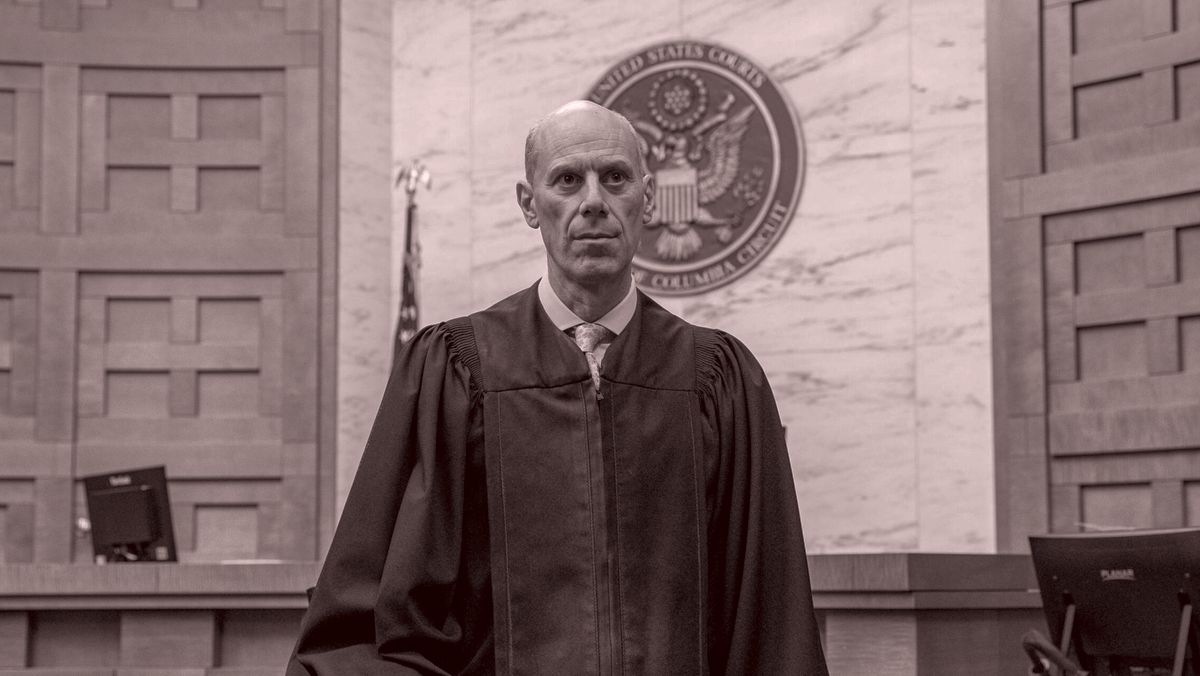Hello and welcome back to The Best & The Brightest. I’m
Leigh Ann Caldwell, midway through another week of critical tests to the bounds of presidential power.
Over the weekend, Donald Trump defied a federal judge’s injunction against deporting hundreds of suspected Venezuelan gang members, flying them to a maximum security prison in El Salvador, claiming the judge was powerless because the planes were already in the air,
and later calling for his impeachment. In tonight’s issue, I explore Congress’s role in the evolving crisis between the president and the judiciary, and whether congressional Republicans, who are already ceding their own power, will help Trump diminish the role of the courts, too.
But first…
|
- Town hall terrors: It’s recess week in Washington, in which members leave the comfort of their Capitol offices for the sometimes meaner streets of their districts. Republican leadership has told its House members not to hold town halls back home to avoid metastasizing anger over DOGE cuts, among other Trump controversies. But local news outlets are still covering organized protests outside members’ district offices, like
this one outside Rep. Mary Miller’s in Illinois. Meanwhile, the liberal grassroots group Indivisible has organized “empty chair” town halls in Republican districts—including in Rep. Marlin Stutzman’s district in
Indiana and in Rep. Jeff Crank’s district in Colorado—to allow activists and constituents to vent before local news
cameras.
Republican members aren’t even invited to these events, I’m told by some Republican offices. But let’s be real, influencing an actual legislator is not necessarily the point: Negative media coverage is.
- Thank you for your service: The readouts from President Trump’s call with Volodymyr Zelensky today were quite positive—a marked reversal from their tense Oval Office meeting late last month, when
J.D. Vance scolded the Ukrainian president for insufficient gratitude to America before Zelensky was kicked out of the White House. Trump, as I’ve noted here, has been rankled by Zelensky’s too-sparse-for-his-liking displays of indebtedness.
Sure enough, in a joint statement from Secretary of State Marco Rubio and National Security Advisor Mike Waltz, the Trump officials noted four times within 480 words that Zelensky had thanked
the president: for a “productive start” to the negotiations; for U.S. Javelin missiles; for “continuing to push” for the release of prisoners of war; and, finally, for his leadership. Zelensky and Trump “had a fantastic phone conversation,” Rubio and Waltz noted, which I’d bet Zelensky is also thankful for.
- I’m just Ken: It’s looking increasingly likely that Texas Attorney General Ken Paxton is going to primary Senator
John Cornyn, after Paxton’s strategically placed Punchbowl News interview this week, in which he sounded a lot like a candidate. The outlet likely has few readers in Texas, but has many on Capitol Hill, and Paxton’s comments felt like a message to Cornyn, Senate Majority Leader John Thune, and N.R.S.C. chairman Tim Scott that he’s serious about running.
As I
reported earlier this month, a senate primary in Texas could cause a lot of heartburn for Republicans, potentially sucking up as much as $100 million even before the general, Republicans tell me. The N.R.S.C. is standing behind Cornyn (indeed, I broke the news that they had advised Rep. Wesley Hunt against challenging him) but Trump is the wild card. After
the Texas House impeached Paxton for bribery and false statements, among other allegations, Trump personally urged the Texas Senate to not convict him, which they didn’t. Cornyn has been working to maintain a decent relationship with the president, but he lacks one quality that endears a politician to this president: survival of a scandal.
|
|
|
Publicly, Trump allies are whipping support to impeach the D.C. Circuit judge
throwing up obstacles to the president’s deportation agenda. Behind the scenes, Republicans say they don’t have the votes—and worry that going to war with the judiciary is a distraction they don’t need.
|
|
|
Capitol Hill, still wrestling with Donald Trump’s efforts to usurp
congressional authority, now faces a more complex, and more dangerous, test: how to deal with the president openly defying a court. Yes, there are disagreements over whether Trump triggered an honest-to-god constitutional crisis this weekend by ignoring D.C. Circuit Judge James Boasberg’s order to halt the deportation of hundreds of alleged Venezuelan gang members to a prison in El Salvador, or if he’s merely flirting with one. Regardless, the episode represents Trump’s
most potent attack yet on the separation of powers. In conversations with lawmakers this week, members of both parties have told me the president and the judiciary are on a collision course.
Trump insists that he hasn’t defied, and wouldn’t defy, a court order—that Boasberg’s injunction was issued only after the planes were already in the
air (though the judge did issue a verbal order to turn any departed planes around, adding, “This is something you need to make sure is complied with immediately”). Citing a technicality, however specious, suggests a level of deference the president hasn’t afforded his friends in the legislative branch, with his elimination of federal agencies, causeless firings of inspectors general, refusal to spend money appropriated by Congress, etcetera. Clearly, the White House is not eager to simply
declare the courts illegitimate.
The president did, however, personally call for Boasberg’s impeachment, a major escalation of the tensions between the executive and the judiciary. “This judge, like many of the Crooked Judges’ I am forced to appear before, should be IMPEACHED!!!” Trump wrote, unleashing a torrent of vitriol from MAGA allies. Trump aide Stephen
Miller likewise made the argument that Boasberg is a bit player in the court system who has overstepped his powers. “Currently, district court judges have assumed the mantle of Secretary of Defense, Secretary of State, Secretary of Homeland Security and Commander-in-Chief,” he posted today on X. “It is madness. It is lunacy. It is pure lawlessness. It is the gravest assault
on democracy. It must and will end.”
House Republicans aren’t ruling anything out. “Everything is on the table,” said Russell Dye, a spokesman for Rep. Jim Jordan, the chair of the Judiciary Committee. A spokesperson for Speaker Mike Johnson said the speaker will work with the Judiciary Committee to “review all available options under the Constitution to address this urgent matter.”
|
Two Republicans, Reps. Eli Crane of Arizona and freshman firebrand
Brandon Gill of Texas, have already introduced articles of impeachment against Boasberg. This is on top of the articles of impeachment some Republicans have introduced against three other judges, for decisions against Trump’s cuts to USAID; efforts to remove LGBTQ content from the Health and Human Services and Centers for Disease Control websites; and DOGE’s access to the Treasury Department’s payment system. The judge “engaged in conduct so utterly lacking in intellectual
honesty and basic integrity that he is guilty of high crimes and misdemeanors,” another pro-impeachment congressman, Andy Ogles, wrote in his version of impeachment articles for two judges. Meanwhile, Senator Chuck Grassley, the chairman of the Senate Judiciary Committee, sent a letter to Attorney General Pam Bondi about “judicial overreach,” hand-writing at the bottom: “Pam: This is a very important issue for me! Please take strong action!”
Grassley plans to hold a hearing in the next couple of weeks on the issue, a person familiar with the planning said.
Still, the reality is that outside the diehards in the Freedom Caucus and Trump’s most loyal foot soldiers, few Republicans on Capitol Hill have any appetite for impeaching judges. Trump and his allies, both online and in Congress, have been vocal about punishing Boasberg, but the votes aren’t even close to being there, multiple Republicans tell me. “We shouldn’t impeach
judges because they render a decision we disagree with. The remedy for bad decisions is getting them overturned on appeal,” Rep. Dusty Johnson, who is relatively close with (though not related to!) Speaker Johnson, told me through a spokesperson. Indeed, while I’m told that the Judiciary Committee is expected to hold hearings on judges, they won’t be the beginning of impeachment proceedings. Instead, they’re viewed internally as an effort to satisfy demands to hold judges
accountable.
Even hardliner Rep. Chip Roy said the House should focus on areas other than impeachment, although his proposed remedies—threatening to defund courts and affirming Trump’s invocation of the Alien Enemies Act of 1798—are also radical. Judicial impeachment, its detractors say, could be a distraction and suck up too much oxygen for Republicans on the Hill; they’ll have enough trouble passing and defending Trump’s tax and spending cuts bill. Few moderate members
want to even broach the subject.
The worry for some is that, like many things in Trump’s world, what starts as a radical-fringe idea could gain wide adoption as a litmus test for the MAGA base. Impeachment has already become the political tool of choice for an angry legislative branch, though it’s generally been threatened against executive branch officials, and it hasn’t been particularly successful. Senate Democrats tried and failed, twice, to convict Trump during his first term. House
Republican leadership was reluctant to move to impeach Joe Biden’s Homeland Security secretary, Alejandro Mayorkas—a villain for conservatives—because it was so unpopular among the rank and file. (They finally did after lots of arm-twisting, and to show the base they could draw blood after failing to find a smoking gun in their investigations of Biden. The Senate didn’t convict.) Skeptics note that only 15 federal judges have been impeached in the
entire history of the United States, mostly for misconduct on the bench.
But it’s clear why the judicial branch is proving bothersome to MAGA, especially as the administration steamrolls a mostly supine Congress. The courts are doing most of the checking-and-balancing in the federal government these days: More than 100 suits have been filed, and 40 injunctions have been handed down, according to Democrats keeping count, which is close to outpacing Trump’s entire first
term in a mere two months. This tracks the growing number of injunctions over time, according to a Harvard Law Review study, from six during President George W. Bush’s two terms, to 12 during President Obama’s two terms, with about half issued by judges appointed by a president from another party. President Biden
got hit with 14 injunctions in his single term, every one of them from a Republican-appointed judge.
But during Trump’s first term, the courts issued a whopping 64 injunctions, with 59 coming from Democratic-appointed judges. White House press secretary Karoline Leavitt, along with Miller, has portrayed such numbers as a partisan attack on Trump specifically. But the law review study suggests that what’s behind these numbers isn’t so much a partisan judiciary as a
president who keeps pushing the bounds of the law. (Interestingly, new data from Stanford professor Adam Bonica indicates that, during Trump 2.0, judges from across the ideological spectrum are ruling against the president at similar rates.)
|
Democrats, for their part, are mostly dismissing Republican calls to impeach judges, knowing
full well that even a successful impeachment in the House could never muster the 67 votes (including 14 Democrats) needed to secure conviction in the Senate. Many are also reluctant to call Trump’s opposition and open threats against the courts a “constitutional crisis,” saying the term is ambiguous and unhelpful. But they’re trying to figure out their own way to push back from their position in the minority.
The case of the deported alleged gang members naturally poses some political
perils. This is where Trump’s team has seemed the most openly defiant of the courts, but the risks for Democrats are twofold: First, judicial independence isn’t necessarily top of mind for voters the way the price of eggs is, and Democrats have recent experience with abstract “fate of democracy” arguments falling flat in 2024. Democrats do think that voters care to some extent, but the second problem is that it’s an awkward look to appear to defend the rights of noncitizen alleged violent
criminals.
“I think a lot of voters are freaked out by the constant chaos and the sense that the Trump administration is a lawbreaking administration,” Senator Sheldon Whitehouse told me. “And that as these decisions pile up, where the Trump administration is obviously and flagrantly wrong, and the response, instead of appeal, is to threaten a political act in impeachment rather than follow through in the courts, that just adds to the sense of chaos, uncertainty, and
misconduct that is taking place.” Senate Democratic leader Chuck Schumer held a rare recess-week conference call with members of the Judiciary Committee on Tuesday to strategize—a meeting, I’m told blandly, that was “productive” and that, “We’re working on it.”
House Democrats, predictably, have been more aggressive. Democratic leader Hakeem Jeffries has set up a litigation and response task force led by Rep. Joe Neguse, a former manager
during Trump’s second impeachment. Rep. Jamie Raskin, the top Democrat on the Judiciary Committee, has been aggressively engaged, spearheading an amicus brief in support of government workers and filing Freedom of Information Act requests to DOGE. Last week, he sent a letter to the Trump administration warning them that government officials who ignore court orders could be slapped with civil or criminal penalties. “In order to ensure that members of your Administration honor
your own commitment to abide by the rule of law,” he wrote, “please remind them of the criminal and civil penalties they may personally face if they fail to comply with court orders.” The courts haven’t gone that far—yet.
|
|
|
Join Emmy Award-winning journalist Peter Hamby, along with the team of expert journalists at Puck, as they let you
in on the conversations insiders are having across the four corners of power in America: Wall Street, Washington, Silicon Valley, and Hollywood. Presented in partnership with Audacy, new episodes publish daily, Monday through Friday.
|
|
|
Unique and privileged insight into the private conversations taking place inside boardrooms and corner offices up
and down Wall Street, relayed by best-selling author, journalist, and former M&A senior banker William D. Cohan.
|
|
|
Need help? Review our FAQ page or contact us for assistance. For brand partnerships, email ads@puck.news.
You received this email because you signed up to receive emails from Puck, or as part of your Puck account associated with . To stop receiving this newsletter and/or manage all your email preferences,
click here.
|
Puck is published by Heat Media LLC. 107 Greenwich St, New York, NY 10006
|
|
|
|


















